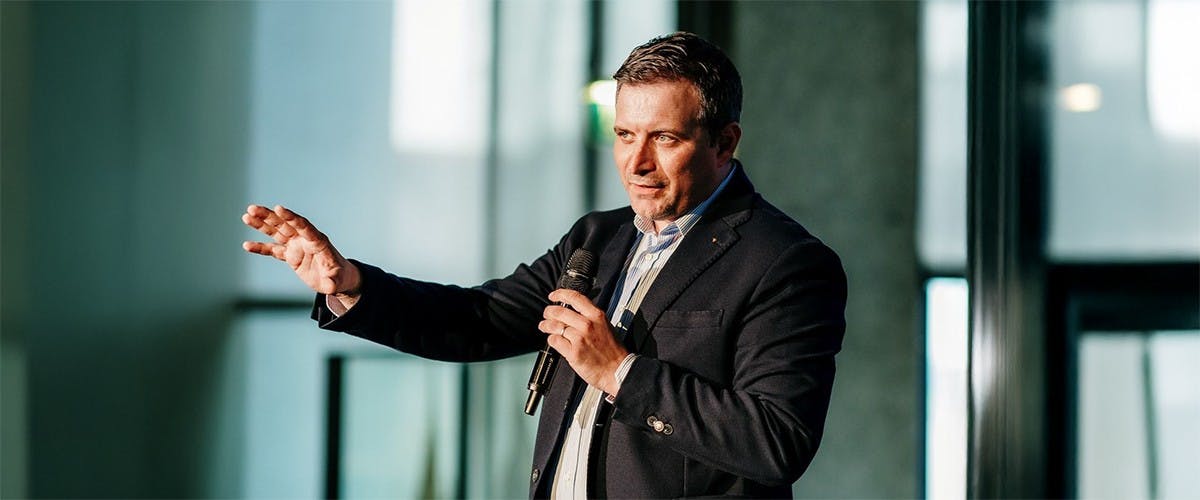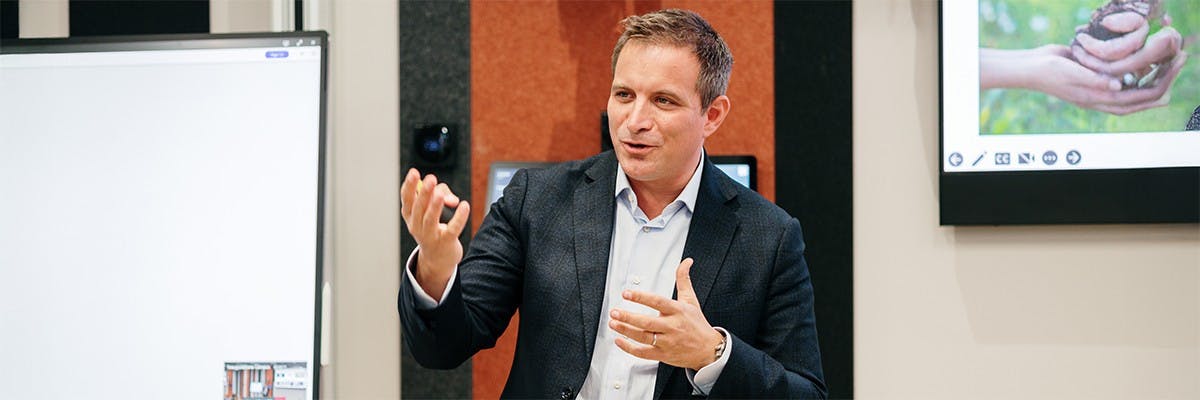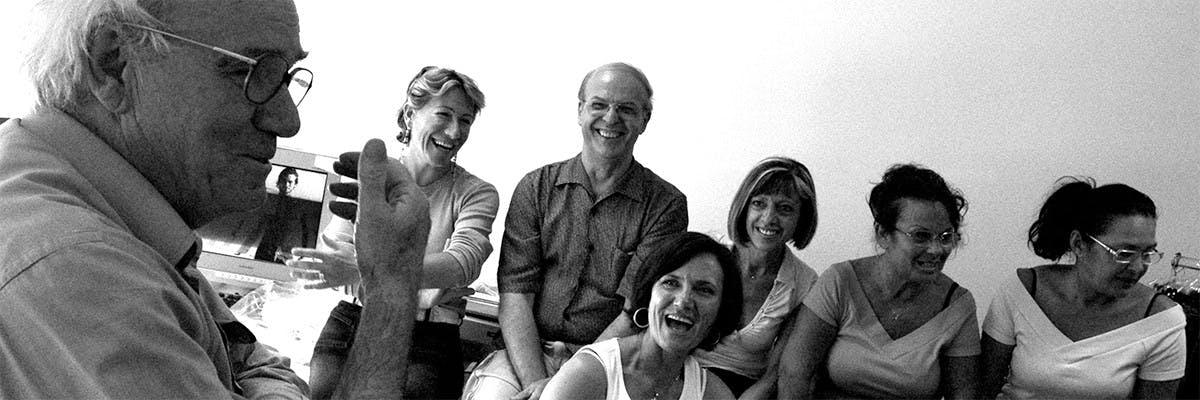belong to history
The deep essence of a company: Prof. Federico Frattini tells about purpose
A deep reflection on the value of corporate purpose: not just a simple goal, but a real intention that guides every decision, strengthens internal bonds, and produces real impact in the territory. A dialogue that helps us rediscover the Dream of Vittorio Tadei and renew every day the meaning of our commitment.

Federico Frattini, Dean of the Graduate School of Management at Politecnico di Milano, studies, teaches, and educates young people, managers and companies to understand the true meaning of purpose - navigating between those who try to label it as a simple objective or aim, and those who struggle to read its impact on Italy’s corporate and cultural fabric.
For us at Teddy, having the opportunity to confront his experience and competence has been a way to deepen and rediscover the dream of our founder, Vittorio Tadei, and to view it in the light of a world that continues to evolve - but that we continue to want to be clothed ever more in beauty and welcome.
Through our conversation with Professor Frattini many questions emerged, all aimed at discovering the deep meaning and real impact that a corporate purpose has on the territory and the lives of those who work in the company. What does it really mean to have a purpose, and in what way does it change how we relate to the Italian corporate context?
Since its appearance in 1957, the concept of purpose took several years to establish itself as a fully explored topic by companies, initially confined within the realms of research or consulting. When contemporary society underwent profound economic changes, from crisis to pandemic, businesses experienced a concrete awareness of the deep responsibility their presence entails, together with a desire to have a positive impact in the world. In this space, the concept of purpose slowly made its way, tying itself to the deeper meaning of the economic activities that a company carries out, going beyond merely achieving financial objectives.

“Purpose is”, Frattini explains, “the aspiration, the reason for being of a business’s activity, beyond the performative goals inherent in the nature of a for-profit enterprise. The search for a purpose is the process that leads to awareness, and subsequently to realise a reason for being by creating value for one’s shareholders. In this sense, the word that more correctly translates the concept of purpose is not goal, but intention”. To put the reason for being first, to project it, to put it before everything else. One sees this clearly by analyzing the etymological meaning of the term, which suggests two paths. The first sees the company adopting a purpose like an individual asking why we live. According to Professor Frattini, then, purpose assumes the role of a “moral compass”, through which one can discriminate between right actions and wrong ones. The second path that purpose proposes is realized in the form of a precise question: what is our true ambition? And thus the reason for being becomes something that supports the entire life of the company. But what are the consequences?
“In over 10 years of research on the subject”, Frattini continues, “we discovered that if a company truly succeeds in adopting a purpose, it obtains concrete benefits, because it gives meaning to what is done and has a real impact on its stakeholders. The true purposes, those that animate business activities giving deeper meaning to the actions, to the economic deeds companies perform, are those that speak of the impact the company wants to have for its employees - a very strong theme at Teddy - and for the communities in which they operate. The more powerful purposes, those defined as ‘high-quality,’ express the reason for being in terms of positive impact that they generate”.
A high-quality purpose, then, touches every aspect of company life: from the spaces, to relationships between colleagues, up to, obviously, the product itself. Everything is read in the light of this deep essence. “As Teddy, you have community at the center, and your activity is clothed for everyone in a deeper meaning”. But there is more: “if a company discovers its purpose, it also becomes an organization in which its reason for being is a very strong bond among people and everyone is potentially bearer of that deep meaning which is now intrinsic in their work”, Frattini clarifies, “and by this effect, the company grows and generates more profit”.

How much do societal changes affect a company’s purpose?
“Companies are economic actors placed within a social context. But when we talk about purpose, we should say that companies become social actors that have an economic aim in what they do. The social context has changed, and it constantly changes to adapt to evolutions from various directions. The new generations entering companies, such as Gen Z, and the data confirms it, have expectations different from those of millennials. They born between ’96 and 2012 seek in their work an opportunity to express what they believe in, they demand from work a meaning that goes beyond the paycheck, and so purpose becomes a way of adapting to this fundamental stakeholder. Then there are consumers, with due differences, but data show that final customers are willing to buy from companies that express a value going far beyond the product features. The impact of the experience economy is now evident: people care about the brand behind the product; consumers have shaped a context that has made purpose fundamental for every company that has an ethical ambition".
Integrating the ideal within the organizational structure of a company, we asked ourselves also what is the responsibility of leadership and how the reason for being can be made one’s own by every protagonist in company life. In this sense, Professor Frattini emphasizes the path and the difficulties encountered in reaching the destination.

“Making purpose a value shared by all is a complicated and long process because it touches all aspects of how the organization operates, including those most difficult to change. It affects attitudes, assumptions, behaviors: it’s a tough journey full of drifts, of slippages, before which one must be absolutely consistent and authentic. The role of leadership is fundamental. A company with a purpose is a divisive company because it asks all collaborators to recognize themselves in that reason for being and, to be effective, any purpose requires the involvement of the largest number possible of people".
As anticipated, the Teddy Group was born from the awareness of its deep reason for being, but also when at a company's roots there is a purpose - just like the one Vittorio Tadei shared with those who collaborated with him in the early days - there is a risk that the essence may be lost. Working by deepening one’s own purpose “is a way of rediscovering something that was already there from the origin, as happened for Teddy. The responsibility of leadership today is to help everyone rediscover the reason for being of their work".

Having made these premises, Professor Frattini highlights a risk that even the most established company faces: “imagining that this path ends at some point; purpose is a flame that must be constantly fed over time”. A path that never ends, a profound meaning that renews, a reason for being to live at every level, to share with all the protagonists of the company. The purpose demands from us a road made of risks and difficulties, certainly, but we have chosen to walk it, and to commit not to take steps backward, because we have truly made the Dream of Vittorio our own, and if there is something we desire to place before any of our ambitious desires, it is to generate value and have real impact on everything around us. This is how we love our work; this is how we want to live our territory.